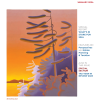In Private Letter Ruling 201528014 (released July 10, 2015) the decedent was survived by her spouse, and a revocable trust that became irrevocable on her death governed the disposition of her assets. The revocable trust directs that after certain other provisions take effect, the balance of the property in the trust will be held in a marital trust for the benefit of the decedent’s surviving spouse. The terms of the marital trust require the trustees to pay all income to the surviving spouse no less frequently than quarter-annually and allow the trustees to distribute so much of the principal of the trust as the marital trust advisor determines for the surviving spouse’s reasonable support, maintenance, education and medical care. On the surviving spouse’s death, the principal of the marital trust is distributed pursuant to the paragraph L of Article VII of the revocable trust.
The executor of the decedent’s estate timely filed an estate tax return and made an election to treat the marital trust as qualified terminable interest property (QTIP) under Internal Revenue Code Section 2056(b)(7). The trustee of the marital trust severed the trust into two shares, one with a generation-skipping transfer (GST) tax inclusion ratio of zero (the GST exempt share) and the other with a GST tax inclusion ratio of one (the GST non-exempt share). The trustee proposes to sever the GST non-exempt share into two trusts, Trust A and Trust B. Trust A will contain a specified dollar amount of cash, and Trust B will contain the balance of the property in the GST non-exempt share. This division is permitted under state law. Following this division, the surviving spouse plans to renounce his entire interest in Trust A by making a non-qualified disclaimer, which is permitted under state law. Thereafter, the property in Trust A will be distributed pursuant to the terms of paragraph L of Article VII of the revocable trust (as if the surviving spouse had predeceased the decedent).
Requested Rulings
The surviving spouse requested the following rulings:
(1) The severance of the GST non-exempt share into two trusts pursuant to state law and the renunciation of the surviving spouse’s entire interest in Trust A will have no effect on the election under IRC Section 2056(b)(7) by the estate to qualify the GST exempt share and the GST non-exempt share for the federal estate tax marital deduction, nor the status of Trust A and Trust B as QTIP trusts.
(2) The subsequent distribution and termination of Trust A won’t cause Trust B or the GST exempt share to fail to be a QTIP under Section 2056(b)(7).
(3) After the surviving spouse renounces his entire interest in the property in Trust A, he’ll be deemed to have made a transfer of all the property of Trust A under IRC Section 2019, other than the value of his qualifying income interest, which he’ll be deemed to have made a transfer of under IRC Section 2511.
(4) After he renounces his entire interest in Trust A, the surviving spouse won’t be deemed to have made a gift of the property in Trust B or the GST exempt share under IRC Section 2519.
(5) After he renounces his entire interest in Trust A, the value of the surviving spouse’s income interest in Trust B and in the GST exempt share won’t be valued at zero under IRC Section 2702.
(6) After he renounces his entire interest in Trust A, the property in Trust A that’s deemed to be transferred under §Section 2519 won’t be included in the surviving spouse’s gross estate under IRC Section 2044(b)(2).
No Loss of Marital Deduction
The GST non-exempt share was treated as QTIP under Section 2056(b)(7), because the surviving spouse has a qualifying income interest for life, and the decedent’s estate made the QTIP election. After the proposed division of the GST non-exempt share into Trust A and Trust B pursuant to state law, the surviving spouse will have a qualifying income interest in both Trust A and Trust B. Therefore, the division of the GST non-exempt share into two trusts and the subsequent disclaimer by the surviving spouse of his interest in Trust A will have no effect on the estate’s election under Section 2056(b)(7) to qualify the GST exempt share and the GST non-exempt share for the federal estate tax marital deduction, nor will it affect the status of Trust A and Trust B as QTIP trusts. Furthermore, the subsequent distribution and termination of Trust A won’t cause Trust B or the GST exempt share to fail to be a QTIP under Section 2056(b)(7).
No Gift When Interest Renounced
Under Section 2519, any disposition by the surviving spouse of all or part of a qualifying income interest for life in any property for which a deduction was allowed under Section 2056(b)(7) is treated as a transfer by the surviving spouse of all interests in the property other than the qualifying income interest. The transfer of the qualifying income interest is subject to gift tax under Section 2511.
The IRS ruled that after the surviving spouse renounces his entire interest in Trust A, he will be deemed to have made a transfer of all of the property in Trust A under Section 2519, other than the value of his qualifying income interest, and he’ll be deemed to have made a transfer of his qualifying income interest under Section 2511. Furthermore, because the surviving spouse’s interest in Trust A is separate and distinct from his interest in Trust B, he won’t be deemed to have made a gift of the property in Trust B when he renounces his interest in Trust A.
Value of Surviving Spouse’s Income Interest Not Zero
Section 2702 provides that the value of any retained interest that’s not a qualified interest is treated as being zero when an individual transfers an interest in trust to or for the benefit of his family. Because the surviving spouse won’t be treated as making a deemed gift under Section 2519 with respect to Trust B, Section 2702 won’t apply to the division of the GST non-exempt share and the surviving spouse’s renunciation of his entire income interest in Trust A. Thus, the value of the spouse’s income interest in Trust B and in the GST exempt trust won’t be valued at zero.
Renounced Property Interest Not Included In Estate
Under Section 2044, if a decedent had a qualifying income interest for life in property for which a deduction was allowed with respect to the transfer of such property to the decedent under Section 2056(b)(7), and Section 2519 didn’t apply with respect to a disposition of such property by the decedent, the value of such property will be included in the value of the decedent’s gross estate. If Section 2519 did apply to a disposition of such property by the decedent prior to his death, then the value of the property isn’t included in the decedent’s gross estate.
When the surviving spouse renounces his interest in Trust A, he’ll be deemed to have made a transfer of that property, other than his qualifying income interest therein, under Section 2519. Because Section 2519 will apply to the disposition of such property, the value of the property in Trust A won’t be included in the surviving spouse’s gross estate under Section 2044(b).






